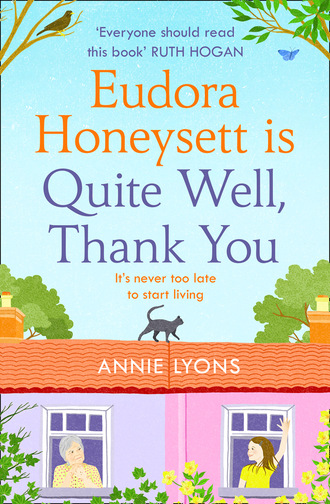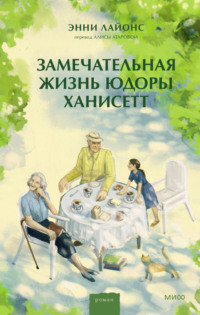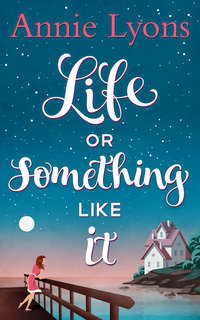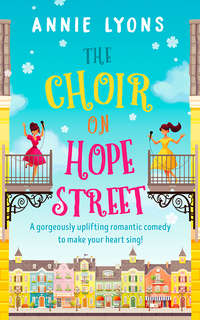
Полная версия
Eudora Honeysett is Quite Well, Thank You
Eudora would never say it out loud, of course, but she found the war thrilling; the idea of their heroic soldiers fighting for freedom, and Mr Churchill leading them to victory, was quite the most exciting thing that had ever happened. She had gone to stay with her mother’s uncle in Suffolk for a while soon after war broke out, but her parents decided that it was safe for her to come back to London. She was sure that it would all be over soon. Life could carry on as it had before the war with their happy family of three.
The waitress appeared moments later with their order and, as Eudora noticed the candle on the top of her cake, she decided that life was perfect.
‘Happy birthday,’ said the waitress, placing it in front of her.
‘Thank you,’ replied Eudora.
‘Happy birthday, Dora,’ said her father. ‘Make a wish.’
Eudora blew out the candle and closed her eyes. I wish. I wish. I wish this moment could last forever.
The air-raid siren screamed its response. Maybe Hitler’s in charge of wishes today, thought Eudora as her father took her hand and led her to the shelter. It was a squash and a squeeze but Eudora didn’t mind because she was safe with him. Nothing bad ever happened when Albert Honeysett was around. In the half-light of the shelter, he pulled her closer, kissing the top of her head.
‘I’ve got a surprise for you,’ he said, pulling a napkin-wrapped parcel from his huge overcoat pocket.
‘My pastry,’ said Eudora. ‘Thank you, Daddy.’
‘Happy birthday, Dora.’
‘Would you like a bite?’ she asked.
She could hear the smile in his voice. ‘No. You enjoy it. It’s your treat for being such a good girl. You make Mummy and me very happy.’
Eudora nestled closer, making sure she savoured every bite, the sharp-sweet taste of apples reminding her of days spent picking fruit from Uncle John’s orchard.
‘It’s a shame Mummy couldn’t come today,’ she said, wiping her mouth on the napkin when she’d finished.
‘Actually, I wanted to talk to you about that.’ Eudora stared up at her father. There was a note of caution in his voice. Her skin prickled in the close heat of the shelter. ‘You see, Mummy is very tired at the moment because she’s going to have a baby.’
Eudora froze, unsure of how to react. Her father seemed to sense this. ‘Now, you don’t need to worry because it’s going to be wonderful. You’ll have a new playmate and someone to be your friend for always.’
Eudora felt reassured. That did sound nice. Most of her friends at school had siblings. She sometimes wondered if she was missing out. ‘And, of course, the baby is going to be the luckiest child in the world to have you as a big sister.’ Eudora nestled her head against her father’s chest, breathing in the peppery scent of tobacco. ‘And there’s something else.’ There was that note of caution again. Eudora held her breath. ‘I’m going away for a while.’
‘Where? How long for? When will you come back?’ The words tumbled from her.
He squeezed her to him. Eudora started to feel claustrophobic. ‘I can’t really say and I don’t know for how long. So I need you to be very brave and look after Mummy and the new baby while I’m away.’
Questions flooded her mind. But why now? And why can’t you say how long? And why don’t you know when you’ll be back? And why can’t you tell me that it’s going to be all right? Eudora pressed her lips together tightly to stop them spilling out because she knew he would never lie to her and, more than anything, she feared the truth.
The all clear sounded but the two of them stayed where they were until everyone else had gone. Her father held her tightly. Years later, Eudora realised that, rather than comforting her, Albert Honeysett had been clinging on to his child, painfully aware of the uncertain future ahead.
‘So, will you look after Mummy and the baby for me? Please?’
She gazed up at him. She thought she saw the reflection of a tear but decided it was a trick of the light. ‘Of course, Daddy. I’ll look after them until you get home and then we can do it together.’
Her father nodded before hurrying them to their feet. ‘Good girl, Dora. I knew I could rely on you.’
As they emerged, blinking, into the light, Eudora stared up and down the street. Everything looked exactly as it had an hour previously. She could see two women through the window of the tea shop, sitting at the table where she and her father had sat earlier, drinking tea and eating sandwiches as if nothing had happened. She watched the buses and taxis hum along the street, the people milling back and forth, continuing with their lives. Business as usual.
In contrast, as she walked along Piccadilly hand-in-hand with her father, it was as if every cell of Eudora’s being had changed. It wasn’t until adulthood that she recognised this as the moment her childhood ended. If she’d known the dark times which lay ahead, Eudora probably would have begged her father to let them run back to the shelter and stay there forever.
Chapter 2
The next morning, Eudora is woken not by her alarm clock but by the sound of a lorry reversing. She retrieves her glasses and looks at the clock. 7.27am. She frowns at the intrusion but as her brain slides into consciousness, Eudora realises that for the first time in many years, she has slept through the night without waking. And then she grasps the unfortunate fact that her bed will need to be changed as a result. She takes a deep breath and hauls herself into a sitting position, contemplating the effort of the task ahead. The words of Ruth, the endlessly encouraging social worker, spring into her mind.
Please be assured that the help is there if you need it.
Then Eudora remembers the booklet she read from cover to cover last night. It galvanises her into action.
‘Come along, Eudora. No sense in idling. Let’s get this done and make that telephone call.’
Stripping the bed is easier than re-making it. Eudora has to take several breaks during the process, cursing the inventor of duvets and fitted sheets as she works. She remembers changing the beds with her mother – the holy trinity of sheet, blanket and eiderdown all smoothed with hospital-cornered precision. Eudora had succumbed to the infernal duvet trend when her mother became ill, deciding that it might make life easier. And it had. For a while. But then she got old and discovered that elasticated sheets and plastic poppers are the enemy of arthritic fingers.
By the time she’s finished, Montgomery has sloped upstairs in search of food. He jumps up onto the freshly made bed with a petulant miaow. Eudora shoos him off, receiving a sharp hiss in reply.
‘You really are the most bad-tempered cat,’ she tells him. He fixes her with a cold green stare before yawning to reveal dagger-sharp teeth.
Like the duvet, she’d bought the cat in a moment of weakness, thinking he would be good company during her twilight years. Sadly, Montgomery has morphed into the equivalent of a long-endured husband – cantankerous, off-hand, and only interested in being fed.
Eudora uses her last remaining energy to dress. She won’t go swimming today. There is a far more important task at hand.
She pulls back the curtains to be confronted with the sight of a removals van, vast as an ocean liner, parked across next door’s kerb and hers as well. A gang of men of different sizes and with varying quantities of body tattoos are loading items of furniture into it with practised efficiency. One of them glances up at her with a cheery smile. Eudora drops the curtain. She doesn’t need distractions from the outside world today.
As she carries her soiled bedsheets to the landing, the cat plants himself with defiance across the top step.
‘If you trip me up, there’ll be no one to feed you,’ she tells him. He stares up at her with momentary distaste but seems to take the point, slinking down the stairs with practised arrogance.
Eudora stuffs her washing into the machine’s gaping mouth and feeds the ungrateful cat, who devours it and exits the house in record time. She settles with tea and toast in the living room, taking tentative bites before realising that she’s ravenous. Once finished, Eudora switches on the radio and decides to close her eyes for a moment before making the phone call. They’re talking about a woman who ended her life at a Swiss clinic. She’d worked as a geriatric nurse and couldn’t bear the idea of old age, having seen the indignities and hardship people had to suffer first-hand.
‘Wise woman,’ murmurs Eudora as she drifts into sleep.
A sharp knock at the door jolts Eudora back to startled consciousness. She closes her eyes again but whoever it is seems determined as they rap the knocker with renewed vigour. Eudora struggles to her feet and makes her way to the door. She is relieved to see that the chain is on, enabling her to peer through the narrow gap. A young, shaven-headed man carrying a large holdall leans forwards with leering smirk.
‘All right, missus. ’Ow are you today?’ he says in that voice which people reserve for the old and infirm. Eudora is used to this but detests it all the same.
‘What do you want?’ she demands with as much fierceness as she can muster. She feels emboldened by the safety chain.
The young man frowns but ploughs on with his pitch. ‘My name’s Josh and I’m part of a scheme to help young offenders reintegrate into the community.’ He speaks as if reading a script and holds up a card, which Eudora can’t read. For all she knows it could be a library card. Although she doubts it.
‘What do you want?’ she repeats. She longs to shut the door on him but is too afraid.
Josh unzips his bag and holds up a dishcloth. ‘I’m selling these. Best cloths out there. Five quid a pack.’
‘I do not require any dishcloths.’
Josh is undeterred. ‘’Ow about tea towels then? Free for a fiver?’
‘No. I don’t want to buy anything. Please leave.’
He stares at her for a second, all traces of friendly patter replaced with glinting menace. ‘Silly old bitch,’ he growls before hauling the bag onto his back and stomping down the path. He pauses at the gate, staring back at her with contempt. ‘’Ope you die soon,’ he adds before clearing his throat and spitting on the floor.
‘That makes two of us,’ says Eudora, shutting the door with trembling relief and turning the deadlock.
Fear often spurs people into action, forcing them to make a clear choice between fight or flight. Eudora doesn’t have the strength or ability to fight anymore but she senses that her own unique version of flight is the right one to follow. A one-way flight and an end to all this.
The world is too much for Eudora and it isn’t even hooligans like Josh who are the worst. Everyone is selfish and caught up with themselves these days. They have no time to notice her or others like her. They consume news or food as if they’re trying to eat the whole world; they watch and judge and spit out their opinions as if they’re the only ones worth listening to. Eudora is invisible to these people but she has stopped noticing them too. They’re welcome to their, ‘post-Brexit, Donald Trump, condemn everyone, be kind to no one’ world. There is no helping them now. Soon enough, she won’t be around to witness their continuous decline into moral torpor. Good riddance and goodnight.
Back in the living room, her hands are shaking as she reaches for the phone. Eudora puts on her reading glasses, finds the number on the back of the booklet and carefully stabs the buttons.
‘Klinik Lebenswahl. Kann ich Ihnen helfen?’ Eudora is surprised to hear German. A reflex part of her brain considers ending the call, such is her long-held loathing of Germans. Other people may have forgiven what happened in the war but she never will. In the nick of time she remembers that this clinic is Swiss-German and therefore there is nothing to fear.
‘Do you speak English?’
The woman’s voice is soft and soothing. Eudora is immediately reassured. ‘Yes, of course. How can I help you?’
Eudora opens the booklet. She wants to get the terminology right. ‘I would like to book myself in for a voluntary assisted death,’ she says firmly. The rush of adrenaline at finally uttering these words out loud is dizzying.
‘I see. And is this the first time you have called us?’
‘No. I telephoned to request a booklet after I read about your organisation.’ She decides not to mention Elsie. This is her decision. The ending to her story. ‘Thank you for posting it to me,’ she continues. ‘I have now read the booklet from cover to cover and made my decision. I would therefore like to book myself in. Please.’
Manners, Eudora, even when discussing your death.
‘I see,’ repeats the woman. ‘Well, as you may know, we have a protocol to follow.’
‘What protocol?’ demands Eudora.
‘We must be sure that you have thought about everything properly and fully, that you understand all the implications, that you have discussed it with those close to you and that you are absolutely sure this is the only option available to you.’
Eudora clears her throat. She has had enough of this woman’s honeyed tones. ‘I am eighty-five years old. I am old and tired and alone. I have nothing I want to do and no one I want to see. I am not depressed, merely done with life. I don’t want to end up dribbling in an old people’s home, wearing adult nappies in front of a shouting television. I want to leave this world with dignity and respect. Now, can you help me or not?’
There is a moment’s pause. ‘Yes. We can help you but there are procedures to be followed. If you are sure, I can send you the forms, which will start the process and we will take it from there. Is that what you would like?’
‘Yes. Please,’ replies Eudora, her voice wavering as she realises that finally someone somewhere is listening. ‘Thank you.’
‘You are welcome.’ She hesitates before continuing. ‘This is an unusual situation for me. Forgive me, but I do understand what you are asking. My grandmother felt the same as you. She wanted to be as good at dying as she’d been at living.’
‘Did she manage it?’ asks Eudora, her curiosity aroused.
‘She did. It’s how I ended up working here.’
Her honesty gives Eudora courage. ‘What’s your name?’
‘Petra.’
‘Thank you, Petra. So, will you send me the forms?’
‘Of course. I am thinking that you are not able to travel to us, so we will be conducting this process by telephone?’
‘Will that be a problem?’
‘It shouldn’t be but you will need to provide various forms and have detailed conversations with Doctor Liebermann. Do you know about the costs?’
‘I can pay.’
‘That’s fine. Forgive me for asking. So, if you would be kind enough to give me a few details, please.’
Eudora does as she asks. ‘And can you tell me how long it takes?’ She doesn’t feel that she needs to add the obvious words, to die.
‘It depends. But I would say between three and four months from when you sign. You can change your mind at any time, of course.’
I won’t, thinks Eudora feeling relieved that she’ll be gone by Christmas – the loneliest, unhappiest time of the year.
‘I will be your contact for the whole process,’ Petra tells her. ‘Please call me at any time with questions or concerns. I am here to help.’
‘Thank you, Petra.’ Eudora hopes the woman can hear how grateful and relieved she is, how much this means to her. She hangs up a short while later with a mixture of euphoria and exhaustion. The die is cast. Eudora hobbles to the kitchen. Standing before the almost blank calendar, she counts forwards four months and writes one word in a shaky, spidery script.
Freedom.
Eudora smiles. She is in control for the first time in years. She won’t be defeated by old age; she will defy it, cast it aside like an unwanted skin. The end will be on her terms and her terms alone.
She is roused from her reverie by a knock at the door. At first she fears it’s that hateful young man returning to terrorise her but the knock is gentler and more considered. She takes a while to reach the door, leaving the chain on as she answers. She peers with a frown into the face of a little girl who wears a blank expression but who, on seeing Eudora, changes it to a frown, mirroring the old woman’s.
‘Yes?’ demands Eudora.
Another face appears above the child’s – a nervously smiling woman with unkempt hair whom Eudora eyes with disdain.
‘Sorry to bother you,’ says the woman a little too loudly.
The child’s frown deepens. ‘Mum. Why are you shouting?’
Eudora raises an eyebrow.
‘Sorry,’ says the woman to the child. ‘Sorry,’ she repeats to Eudora. ‘We just wanted to introduce ourselves. We’re your new neighbours.’
‘Oh,’ says Eudora.
‘Why have you got this chain on your door? Is it broken?’ asks the little girl.
‘It’s to keep out unwanted intruders,’ replies Eudora with meaning.
‘We’re not intruders so you can open it properly, if you like.’ Eudora does not like but she is never rude. She unhooks the chain. ‘That’s better,’ says the little girl. ‘I’m Rose Trewidney, by the way.’ Eudora regards Rose Trewidney for a moment. She is dressed in a cherry-red T-shirt calamitously teamed with a purple ra-ra skirt.
‘And I’m Maggie,’ adds her mother. ‘We’ve moved up from Cornwall today. It’s been quite a journey but we’ve made it. It seems like a lovely neighbourhood, rather fewer beaches than Cornwall, of course.’ Maggie laughs although Eudora has no idea why. She remains silent as this woman fills the air with words. She is aware of the little girl gazing up at her. Eventually Maggie runs out of words. ‘So anyway, we just wanted to say, “hi”.’
‘Will that removals lorry be there long?’ demands Eudora, nodding in its direction.
Maggie glances over her shoulder. ‘Oh, erm, hopefully not. Is it in your way?’
‘It is parked over the space in front of my house.’
‘Right, well, I’m very sorry about that.’
‘What’s your cat called?’ asks Rose, ignoring the tension building above her head.
‘Montgomery,’ says Eudora irritably.
‘Aww, Montgomery. Here Montgomery,’ says Rose, kneeling down, making kissing noises to entice him.
‘He’s not very friendly,’ warns Eudora.
The cat makes a beeline for Rose and to Eudora’s amazement not only allows her to stroke him but starts to purr when she makes the potentially life-threatening move to pick him up. ‘Aww, you’re a lovely boy, aren’t you? We used to have a cat but he got run over.’ Eudora stares as Rose hugs the cat tightly whilst firing a series of questions at her. She finds herself with no choice but to answer.
‘What’s your name?’
‘Eudora.’
‘And how old are you?’
‘Eighty-five.’
‘I’m ten. Do you live here alone?’
‘Yes.’
‘And do you have any children?’
‘No.’
‘That must be lonely.’
Eudora frowns. ‘It isn’t.’
‘Do you like the Queen?’
‘Of course.’
‘Me too.’
Her mother interjects. ‘Rose, I think we’ve taken up quite enough of Eudora’s time,’ she says. She mouths an apology to the old woman. ‘Come on. Let’s go and sort out your room.’
‘Oh. Okay,’ says Rose. She kisses the cat on his head and plonks him on the floor before following her mother back down the path.
‘Bye Eudora. Bye Montgomery. See you soon.’
Eudora closes her front door and stands there for a moment, wondering what on earth has just happened. A sound emits from her mouth – a strange, foreign sound – quiet and wholly unexpected. The cat stares up at her in surprise as he hears his owner chuckle for the first time in his living memory before he skulks away in search of food.
* * *
1940, Sidney Avenue, south-east London
Stella Honeysett announced her arrival to the world with a scream as piercing as the siren’s wail that forced her labouring mother into the Anderson shelter, which Albert had built before he left.
‘To keep my angels safe,’ he’d told Eudora as she helped him cover its corrugated iron structure with tarpaulin and watched while he shovelled great spades full of earth on top. ‘Snug as a bug,’ he said, standing back to admire their handiwork. He glanced down at Eudora with a smile. ‘Now, will you help me re-plant my poor old marrow on top? I had to dig him up to make way for your new night-time home.’
‘Of course, Daddy.’
‘Good girl. And then we can make it nice and cosy inside for you and Mummy.’
‘And the new baby,’ said Eudora, adopting what she hoped was a responsible expression.
Albert leant down to kiss the top of her head. ‘I can see that I’m leaving Mummy and your new brother or sister in good hands.’
Eudora beamed up at him like a flower turning its head towards the sun. Although she didn’t want her father to leave, she knew that he was doing his duty and that Eudora, in turn, must do hers. She was sure that if she did exactly as her father asked, God and Mr Churchill would send him back to them unharmed.
‘Someone’s gone up in the world,’ came an accusing voice from over the fence.
‘Good afternoon, Mr Crabb,’ said Albert, propping his shovel against the new shelter and approaching their neighbour. ‘You and Mrs Crabb are more than welcome to use our shelter if London’s bombed – there’s enough room for six people.’
Mr Crabb looked appalled. ‘Adolf Hitler is not going to chase me from my bed.’ Eudora’s eyes grew wide as an image of their terrifying enemy chasing Mr Crabb around his bedroom flooded her imagination. ‘We didn’t let Fritz beat us last time and we’re damn well not going to let them beat us this time!’
Eudora gasped. Albert placed a reassuring hand on her shoulder. ‘Well, you’re both welcome if you change your mind. Now, if you’ll excuse us,’ he said, leading his daughter away. Mr Crabb was still muttering about ‘the bastard Boche’. Eudora clung tighter to her father’s hand. She sometimes woke to hear their neighbour crying out in the dead of night. It was a chilling sound, not of anger but more like an animal, trapped and desperate. The first time she heard it, she ran from her room and bumped straight into her father on the landing. He had knelt down, pulling her trembling body close. ‘It’s all right, my darling Dora. It’s all right. Mr Crabb can’t help it. He lost his son during the war, you see, and he’s having a nightmare. That’s all. It’s a terrible nightmare. Do you understand?’
Eudora didn’t but nodded her head rapidly to pretend that she did. Any shared confidence with her father was treasure to Eudora, a precious gem to be cushioned in her heart forever. She always tried to be kind whenever she saw Mr Crabb but there was something about his wild gaze and unpredictable nature which terrified her.
Eudora helped her father drag an old rectangle of carpet into the shelter and held pieces of wire mesh across wooden frames whilst he nailed them together to craft makeshift beds. Albert placed roll-up mattresses on top of the bedframes and stood back satisfied.
‘Shall we try them for size, Dora?’ he asked, eyes sparkling as he lit a candle and placed it inside a flowerpot.
‘Okay, Daddy,’ said Eudora, wriggling into the tiny space. ‘It’s very cosy.’ She giggled.
Albert took his place on the other side and smiled at her. ‘See? I told you. Snug as bugs,’ he said reaching out across the divide. She placed her small hand in his and wished, as she always did with her father, that they could stay like this forever. Life hadn’t changed that much since the start of the war. She had to carry her gas mask with her at all times and listen out for the air-raid sirens but apart from that, they carried on as before. Her father would listen to the news on the wireless every evening. Eudora would sit by his feet and try to do the same. She didn’t understand much of what was being said but she heard her father reassuring her mother that they were safe in London. This was enough for Eudora. Her father would never lie to them. As long as he declared them to be safe, all would be well.






